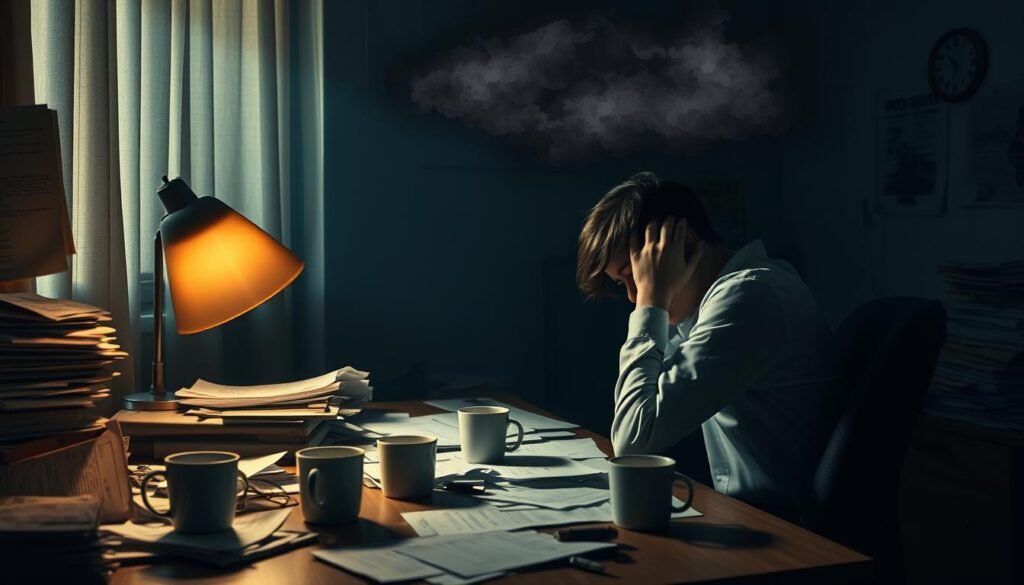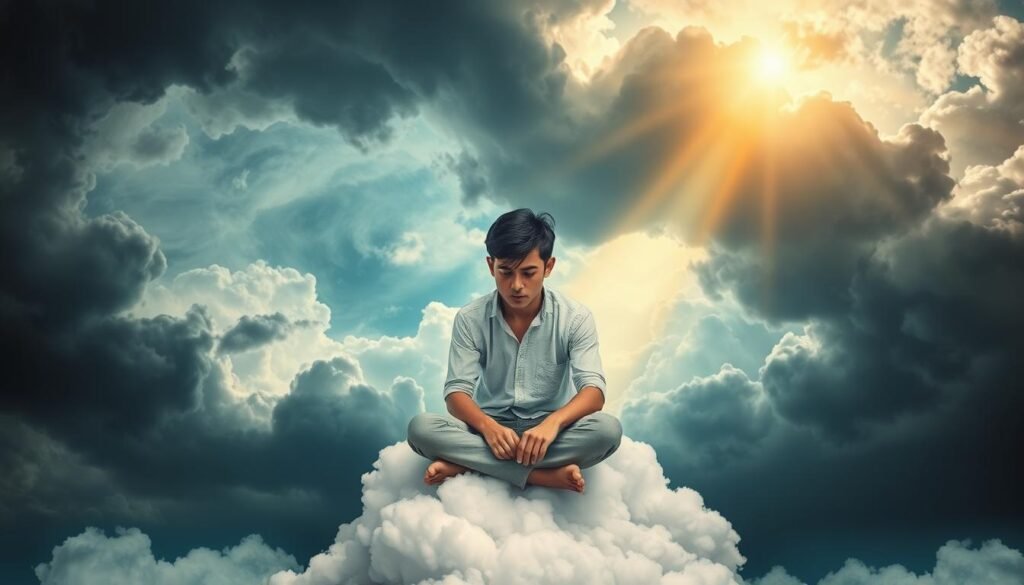It’s shocking to learn that up to 30% of Americans will face an anxiety disorder during their life. This makes anxiety the top mental health issue in the USA. So, it brings up an important question: does anxiety tire you out? Many people with anxiety often feel constantly mentally drained. This energy loss from anxiety creates a harmful cycle. It makes the tiredness worse, impacting one’s mental and physical health.
To tackle these challenges, it’s crucial to understand the link between anxiety and exhaustion. The tiredness from anxiety is not just because you’re stressed. It’s a complex problem that lowers your daily performance and life quality. Learning how anxiety leads to mental tiredness can help you find ways to fight it. You can look into professional advice for battling anxiety-related tiredness. For more details and tips, check out this resource.
Key Takeaways
- Anxiety affects nearly 30% of Americans, leading to significant mental fatigue.
- The exhaustion derived from anxiety often results in a vicious cycle impacting daily life.
- Effective strategies, including relaxation techniques and healthy lifestyle changes, can mitigate anxiety-related fatigue.
- Getting the recommended 7 to 9 hours of sleep can relieve both mental and physical exhaustion.
- Consulting a primary care physician is beneficial for those experiencing chronic stress symptoms.
Understanding Mental Fatigue
Mental fatigue deeply affects our day-to-day life. It makes focusing hard and shakes our emotional balance. It often starts after too much thinking or stress. Knowing what mental fatigue is helps us find and fix deeper problems like anxiety burnout, a common issue.
Definition of Mental Exhaustion
Mental exhaustion means feeling totally drained in your mind. People can’t focus well, which hurts how much they can do and their mood. It can come from too much worry, tough duties, and long periods of brain work.
How Mental Fatigue Develops
Mental fatigue sneaks up, mainly if you’re always dealing with emotional or thinking tasks without resting well. Things that start it include:
- High-pressure work environments
- Chronic stress from personal and professional life
- Unresolved psychological issues that loom constantly
These elements team up, hurting our mental health. They bring on anxious burnout, making people feel swamped and tired.
| Factor | Description |
|---|---|
| High-Pressure Work Environments | Too much pressure and deadlines make stress, leading to mental fatigue. |
| Chronic Stress | Non-stop emotional stress stops the mind from recovering, causing tiredness. |
| Psychological Issues | Ignoring mental health issues greatly raises chances of fatigue and burnout. |
Grasping what mental fatigue is and how it forms allows us to find better ways to handle it. This leads those affected toward better emotional and mental health.
Symptoms of Mental Exhaustion
Mental exhaustion shows through emotional, physical, and behavioral signs. Understanding these can help those with anxiety and tiredness. It’s important to recognize and address these symptoms early.
Emotional and Mental Signs
Feelings of detachment and constant worry are common. People may also feel irritable and find it hard to focus. A drop in motivation and less emotion shown are signs too.
This makes daily tasks seem very hard. It adds to the stress and tiredness one feels.
Physical Signs
Chronic tiredness, headaches, and muscle pain are physical signs. Trouble sleeping can hurt one’s health a lot. A weaker immune system may cause more sicknesses.
It’s key to deal with these physical signs. They make the feelings of mental tiredness worse.
Behavioral Signs
Behavioral signs include putting things off and doing worse at tasks. Avoiding friends and activities is another sign. Some might drink alcohol to try to feel better.
This can make the sense of tiredness and being alone worse. Spotting these signs early can help one feel better sooner.

What Causes Mental Fatigue?
Mental fatigue comes from many sources. It’s vital to know what causes it to manage its effects. This type of fatigue could be due to intense thinking, ongoing stress, or tough situations. These factors often lead to feeling very tired and stressed out.
Intense Cognitive Activity
Working hard without breaks increases mental fatigue. Spending too much time on hard tasks makes your brain tired and less effective. For example, people with demanding jobs feel worn out by the day’s end without moving much. This constant strain makes it hard to escape from feeling mentally tired.
Chronic Stress and Anxiety
Long-term stress is closely connected to feeling very tired. Being exposed to stress all the time can make you feel always exhausted. People dealing with anxiety or depression face this tiredness even when they’re getting better. This makes it harder to handle stress and leaves them feeling tired all the time.
High-Pressure Environments
Stressful workplaces add to mental tiredness. Jobs or home duties that need non-stop focus cause a lot of stress. Being in these situations often can make the fatigue worse. If there’s no support, it’s even harder. It’s important for everyone to make sure there’s a good balance between work and relaxation.

| Cause | Description | Impact on Mental Health |
|---|---|---|
| Intense Cognitive Activity | Extended focus and high-demand tasks | Leads to exhaustion and decreased efficiency |
| Chronic Stress and Anxiety | Continuous exposure to stressors | Results in persistent fatigue and lowered coping capacity |
| High-Pressure Environments | Demanding workplace or personal situations | Contributes to anxiety and mental stress |
Does Anxiety Make You Tired
Anxiety and fatigue are closely linked, especially for those dealing with mental health struggles. Many people find that constant worrying leaves them feeling drained, both mentally and physically. This often leads to a lack of energy and motivation, making one wonder about the impact of anxiety on their tiredness.
The Connection Between Anxiety and Fatigue
People with anxiety may feel tired because their condition consumes a lot of energy. The stress and worry can lead to a cycle of feeling tired and then more stressed. This means their energy might feel like it’s always running low, affecting daily life and happiness.
Hormonal Responses and Energy Drain
During anxiety episodes, our bodies release hormones like adrenaline and cortisol. These hormones get us ready to face threats but can exhaust us when the danger is gone. This can cause an adrenaline crash, making one feel very tired after feeling anxious.
Anxiety’s Long-Term Effects on Energy Levels
Dealing with anxiety for a long time can result in always feeling tired and unable to do daily tasks. It makes life more difficult, both physically and emotionally. For tips on how to handle this tiredness, check out this helpful guide.

The Relationship Between Stress and Fatigue
Recent studies have shown a link between stress and fatigue. It’s important to see how stress affects our feeling of tiredness. The role of chronic stress in this is also significant.
Stress Response Mechanisms
When stressed, our bodies react with hormonal responses. In the short term, this is good. It gives us energy and focus. But, if stress lasts too long, it leads to fatigue. This makes us less sharp mentally and physically tired. Our bodies get worn out from being on high alert all the time.
Chronic vs. Acute Stress Effects
Short-term stress can make us more alert. However, long-term stress builds up fatigue over time. People with ongoing stress struggle with sleep, have lower energy, and feel less healthy. Studies show a big link between stress levels and fatigue. For example, 9.7% reported severe fatigue lasting more than six months. Also, 25.9% of men and 34.5% of women said they felt moderately tired in the last six months.
Knowing how stress and fatigue are connected is key. Managing stress well is crucial. It can soften the long-term effects of stress and improve our health.
Anxiety and Poor Sleep
The link between anxiety and sleep is both complex and key to our well-being. Anxiety can mess with how well we sleep, leading to negatives like poor health. It’s vital to understand this connection to keep our minds and bodies healthy.
How Anxiety Disrupts Sleep Patterns
Anxiety can trap you in a vicious cycle of sleepless nights and more anxiety. At night, worries can make it hard to fall and stay asleep. This lack of sleep can make us depend on bad habits and make anxiety even worse. Nearly 30% of adults fight anxiety disorders, which often show up as sleep problems.
The active brain of someone with anxiety makes it really hard to get good sleep. This adds to the bad sleep-anxiety loop, preventing restful nights.
The Impact of Sleep Deprivation on Mental State
Not getting enough sleep can mess with how we feel and think. It can make us tired and cranky, which can make anxiety worse. Sleep loss makes the brain’s emotional center, the amygdala, overly active. This deals especially with anxiety.
Too little sleep might raise cortisol, a stress hormone, making daily stresses harder to handle. Poor sleep can make us more prone to anxiety when stressed. Better sleep and managing anxiety, like with good sleep habits and therapy, can improve our lives.
Managing Anxiety-Related Fatigue
Managing anxiety-related fatigue takes a whole approach, focusing on both mind and body health.
Learning about healthy lifestyle changes is key in reducing both tiredness and anxiety.
Those who are battling this kind of fatigue should embrace various methods to enhance their life quality.
Healthy Lifestyle Changes
Exercise and eating right are essential for dealing with anxiety-related fatigue. Physical activity releases tension and helps manage stress hormones. Here are some basic changes to fight fatigue:
- Incorporating regular exercise, such as walking, yoga, or dancing.
- Eating nutrient-dense foods like berries, nuts, and green vegetables.
- Staying hydrated to ensure optimal energy levels.
- Establishing a consistent sleep routine to enhance overall well-being.
Check out this resource for more details on these lifestyle changes.
Relaxation Techniques
Relaxation techniques greatly lower anxiety and fight fatigue. Mindfulness, yoga, and meditation help promote serenity. They let people manage stress better. Breathing exercises also improve focus and ease anxiety. This makes relaxing anytime possible.
Seeking Professional Help
If you can’t find relief on your own, it’s okay to look for professional help. Therapists can create custom strategies, including therapy or meds, for severe anxiety. A mental health professional can offer a structured way to deal with anxiety and its related fatigue. This improves sleep and mental health overall.
Lifestyle Changes to Combat Mental Fatigue
Making positive changes in how you live can really help fight mental tiredness. It’s key for clearer thinking and feeling better overall. Small daily tweaks can boost both your body and mind. This leads to more energy and less weariness.
Importance of Regular Exercise
Staying active is great for your mind and body. Try to get at least 2 hours and 30 minutes of aerobic exercise every week. It’s good for your heart and boosts your stamina over time. Things like running, biking, or fast walks make you less sluggish and more lively.
The Role of a Balanced Diet
Eating right plays a big part in fighting off mental fatigue. A diet full of nutritious foods keeps your energy steady all day. Focus on eating proteins, fiber, vitamins, and minerals to help your brain work best. Eating less sugar and bad fats also cuts down on stress and keeps your energy up.
Sleep Hygiene Practices
Good sleep habits are crucial for feeling rested and alert. Stick to a regular bedtime, have a relaxing pre-sleep routine, and limit screen use before bed. These steps lead to better sleep. And better sleep means you’re sharper and more energetic when you’re awake.
| Lifestyle Change | Benefits |
|---|---|
| Regular Exercise | Boosts energy levels, enhances mood, reduces stress |
| Balanced Diet | Supports brain function, stabilizes mood, maintains energy |
| Sleep Hygiene Practices | Improves sleep quality, enhances alertness, lowers fatigue |
Conclusion
Anxiety and fatigue are closely linked, making it crucial to understand this connection. Knowing how anxiety leads to tiredness helps us tackle it better. It’s important to spot the signs and reasons behind this fatigue.
Taking control of anxiety-related tiredness means making some positive life changes. Exercise, a good diet, and relaxation techniques are key. Professional help can also offer specific ways to deal with anxiety symptoms, leading to more energy.
Understanding how anxiety and fatigue affect each other gives us the power to improve our health. Taking action helps us grow personally and live a more energized, balanced life.